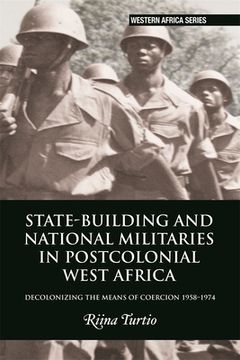State-Building and National Militaries in Postcolonial West Africa: Decolonizing the Means of Coercion 1958–1974 (Western Africa Series, 18) (en Inglés)
Reseña del libro "State-Building and National Militaries in Postcolonial West Africa: Decolonizing the Means of Coercion 1958–1974 (Western Africa Series, 18) (en Inglés)"
Explores the fundamental role of the military in state-building in francophone postcolonial West Africa and how foreign economic and military aid has influenced it. How did African armed forces in postcolonial states in francophone West Africa influence decolonization and state-building in African states? How did foreign assistance from ex-colonial powers, the USSR and the US and colonial state structures influence political systems, and sometimes result in weak and unstable governance? This book explores the development of national militaries in Cote d'Ivoire, Dahomey (now Benin), Guinea, Mali, Mauritania, Niger, Senegal, Upper Volta (now Burkina Faso) and Togo during the 1960s and 1970s. Revealing the strength of decision-making power by African political elites, the study also shows the decisive impact of foreign economic and military assistance on countries that did not experience a prolonged armed conflict. The author provides new insights into the way the decisions of African governments in building their national militaries impacted postcolonial states' autonomy, legitimacy, sovereign control and governance.In West Africa, during the 1960s, France sought to maintain exclusive relations with its former colonies through military assistance, economic aid and close personal relations with African political and military elites. State coercive capacities extended far beyond the strength of political institutions, with soldiers' assumption of political roles linked to the weaknesses of colonial and postcolonial structures. Disagreements between French and American officials, as well as Arab-Israeli and Sino-Russo conflicts, increased African presidents' opportunities to mobilize external resources. Yet in the late 1980s, it became evident that national militaries and police were often the main causes of personal insecurity, rather than providing protection, and that some economies remained weak and political structures unstable. This book is available as Open Access under the Creative Commons license CC-BY-NC. The open access version of this publication was funded by the Swiss National Science Foundation.

